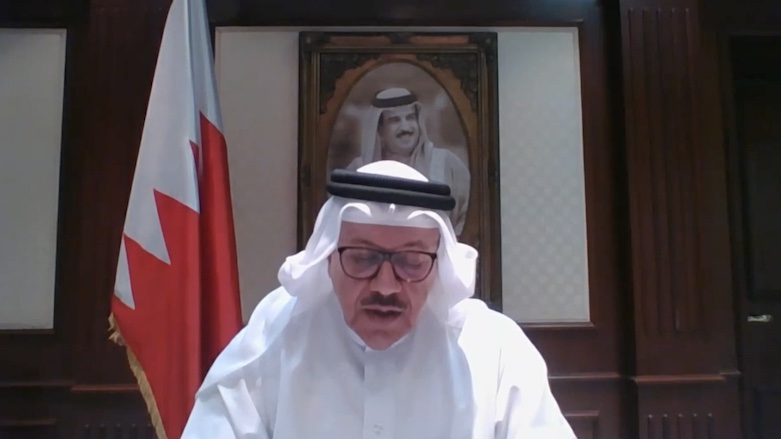US begins Bahrain Strategic Dialogue; Solidifies Abraham Accords and regional isolation of Iran

WASHINGTON DC (Kurdistan 24) – US Secretary of State Mike Pompeo and Bahraini Foreign Minister, Dr. Abdullatif bin Rashid al-Zayani, launched a US-Bahrain Strategic Dialogue with a virtual meeting on Tuesday.
The event follows the start of the Strategic Dialogue between the US and the United Arab Emirates a little over a month ago.
Read More: First round of US-UAE Strategic Dialogue held, amid further progress in Arab-Israeli relations
Both Bahrain and the UAE have agreed to normalize relations with Israel in what Washington has dubbed “the Abraham Accords,” alluding to the common ancestor of Jews and Muslims.
Read More: Israel signs accords with UAE, Bahrain
The first session of the Strategic Dialogue with Bahrain came as the Trump administration seeks to consolidate its achievements in the fields of Arab-Israeli reconciliation, as well as building a regional alliance against Iran.
Progress with the Abraham Accords
The launch of the US-Bahrain dialogue occurred on the same day as a large Bahraini delegation, led by the Industry, Commerce, and Tourism Minister, Zayed bin Rashid al-Zayani, and consisting of some 40 people, arrived in Israel for two days of discussions on increasing economic cooperation and tourism between the two countries.
Also on Tuesday, Israel’s first commercial flight to the UAE took off from Ben Gurion airport, flying to Dubai over Saudi airspace. Saudi permission for the flight was delayed until the last minute but was granted on Monday evening, following Riyadh’s earlier agreement to allow non-Israeli carriers to use its airspace to fly to Israel.
The UAE carrier, flydubai, began flying directly to Israel on Nov. 26.
Three Israeli airlines are scheduled to operate flights to Dubai, with over 40 such flights per week. Once in the UAE, of course, they will be able to fly on to Asian cities, taking hours off the route, which once required them to skirt Saudi Arabia.
Behind the scenes, Saudi Arabia is supporting the agreements of the two smaller Gulf states to normalize ties with Israel but has been unwilling to do so itself.
Two weeks ago, on Nov. 22, there was an unprecedented meeting in Saudi Arabia among Israeli Prime Minister Benjamin Netanyahu, Saudi Crown Prince Mohammed bin Salman (MBS), and US Secretary of State Pompeo.
According to the British journalist, David Hearst, long-time Middle East correspondent for The Guardian and now editor-in-chief of Middle East Eye, Netanyahu pushed for a strike on Iran, while Donald Trump was still in office. However, Pompeo, himself, was non-committal, and MBS was hesitant about such a risky adventure, particularly as he did not think the incoming US President, Joe Biden, would continue Trump’s tough position against Iran.
MBS was also unwilling to accede to Pompeo’s pressure to normalize ties with Israel, according to Hearst, in significant part because his father, who is still formally the ruler of the country, opposes that step.
US-Bahrain Strategic Dialogue
Both Pompeo and Zayani addressed the media via video conference on Tuesday. Pompeo hailed the long history of US military cooperation with Bahrain, which goes back over 70 years, when Bahrain was still a British protectorate, and the US established a small naval facility there during World War II.
That facility has since grown into the headquarters for the US Navy’s Fifth Fleet and its Central Command.
Pompeo stressed the importance of that facility. It “allows us to collaborate across the board, from fighting terrorism to safeguarding the passage of goods in the Gulf, free from Iran’s maritime attacks,” he said.
Pompeo stressed that Iran was “the number-one threat to Gulf security and to peace-loving people throughout the entire region.”
Zayani spoke similarly. “For 70 or 75 years, the Bahrain-US partnership has been a bedrock of Gulf security, and from Bahrain’s perspective, we see this role continuing and growing in importance.”
“But it will also come under renewed challenge from parties seeking to undermine Middle East stability,” Zayani continued. “Primarily, that means Iran, whose malign intent and activities are more blatant than ever.”
The start of the “Strategic Dialogue” is to be followed up by the establishment of five working groups from the State Department and the Bahraini Foreign Ministry.
Background of Dr. Abdullatif bin Rashid al-Zayani
Zayani represents the emergence of a new, western-educated governing class in the smaller Gulf states, like Bahrain. He is a graduate of Britain’s renowned Royal Military Academy Sandhurst and served as a commissioned officer in the Bahrain Defense Force.
As a military officer, Zayani studied at the Air Force Institute of Technology in Dayton, Ohio, where he received a master’s degree, and later he received his doctorate from the Naval Postgraduate School in Monterey, California.
The King of Bahrain, Hamad bin Isa al-Khalifa, attended secondary school in Britain, before studying at a British Officer Cadet School, and later at the US Army Command and General Staff College, a point noted by Pompeo.
However, they are both significantly older and more experienced than the 35-year-old MBS, sometimes seen as a brash upstart. King Hamad is 70 years old, and Zayani is 66.
Editing by Karzan Sulaivany
